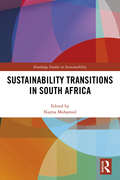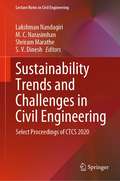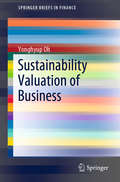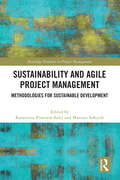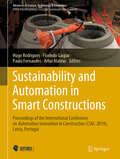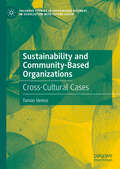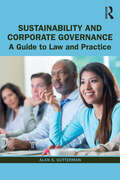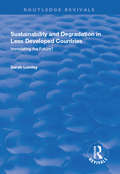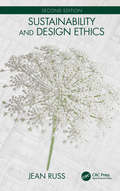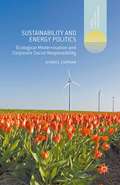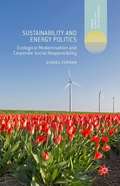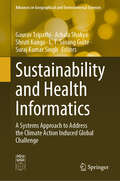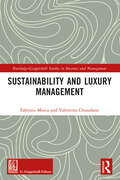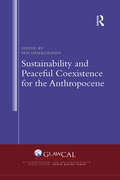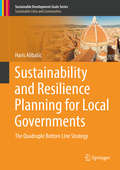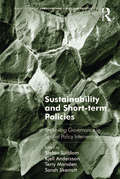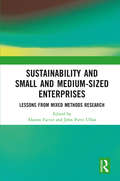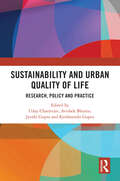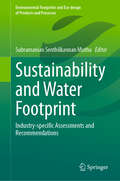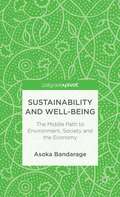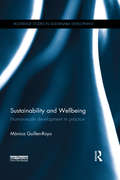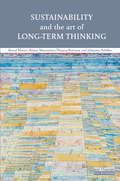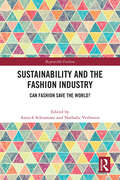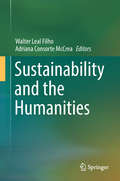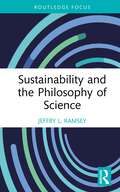- Table View
- List View
Sustainability Transitions in South Africa (Routledge Studies in Sustainability)
by Najma MohamedSouth Africa’s transition to a greener economy features prominently in the long-term development vision of the country, and is an integral part of the country’s national climate change response strategy. Despite significant gains in socio-economic development since its transition to democracy, the country continues to face the triple challenges of rising unemployment, income inequality and poverty – amid a slowdown in economic growth. Sustainability transitions offer new ways of shifting the trajectory of South Africa’s resource-intensive economy towards low-carbon pathways linked to the country’s transformative development agenda. Calls for inclusive approaches to greening the South African economy, which addresses the most vulnerable in society and ensures that the benefits of sustainability innovations reach all South Africans, are becoming more pronounced as sustainable development policy reforms are being implemented. The question that should be placed centre stage in South Africa’s sustainability discourse is whether notions of justice and inclusivity are being sufficiently addressed in the design and implementation of policy and programme interventions. This book explores South Africa’s sustainability transition through reflections on critical policy, economic, technological, social and environmental drivers. It provides a synthesis of theoretical insights, including new models and concepts, and praxis through illustrations from South Africa’s growing landscape of sustainable development policies and programmes. Finally, it assesses whether these transition pathways are beginning to reconfigure the system-level structures hindering the country’s goal of ‘ensuring environmental sustainability and an equitable transition to a low-carbon economy’.
Sustainability Trends and Challenges in Civil Engineering: Select Proceedings of CTCS 2020 (Lecture Notes in Civil Engineering #162)
by M. C. Narasimhan S. V. Dinesh Shriram Marathe Lakshman NandagiriThis book presents the select proceedings of the International Conference on Civil Engineering Trends and Challenges for Sustainability (CTCS 2020). The chapters discuss emerging and latest research and advances in sustainability in different areas of civil engineering, which aim to provide solutions to sustainable development. The contents are broadly divided into the following categories: construction technology and building materials, structural engineering, transportation and geotechnical engineering, environmental and water resources engineering, and RS-GIS applications. This book will be of potential interest to beginners, researchers, and professionals working in the area of sustainable civil engineering and related fields.
Sustainability Valuation of Business (SpringerBriefs in Finance)
by Yonghyup OhThis book discusses the concept of sustainability valuation, a method in which corporate social responsibility (CSR) among other factors is embedded in the cash value of a given firm. It proposes a new, holistic way of representing sustainability in a theoretical framework, and discusses the role of policy in determining a firm’s cash value. Moreover, it addresses the method’s potential, the challenges involved in its practical application, and how it can be adapted to specific cases. By shaking up the field of firm valuation in an era characterized by global sustainable development, the book makes a valuable contribution to the available literature on finance, sustainability science, and policymaking.
Sustainability and Agile Project Management: Methodologies for Sustainable Development (ISSN)
by Mariusz Sołtysik Katarzyna Piwowar-SulejSustainable project management is a new school of management thought and a growing trend yet there is a scarcity of research on the linkage between individual PM methodologies and sustainability in projects. This book fills a gap through the theoretical and empirical research on the implications of sustainability in project management and, in particular, agile project management.The book explores three main themes. Firstly, it identifies and assesses the validity of the application of the concepts of sustainable development in the family of agile methodological frameworks. Secondly, the research results are presented as an introduction to further in-depth research on the future relationships between sustainable development and agile project management. Thirdly, the book identifies the competencies that are needed to successful implement projects in the context of sustainable development.Sustainability and Agile Project Management will be of direct appeal to academics and scholars in the management sciences, including project management, corporate governance and human resource management.
Sustainability and Automation in Smart Constructions: Proceedings of the International Conference on Automation Innovation in Construction (CIAC-2019), Leiria, Portugal (Advances in Science, Technology & Innovation)
by Hugo Rodrigues Florindo Gaspar Paulo Fernandes Artur MateusThis book gathers outstanding papers presented at the Conference on Automation Innovation in Construction (CIAC-2019). In recent years, there have been significant transformations in the construction sector regarding production and the use of computers and automation to create smart and autonomous systems. At the same time, innovative construction materials and alternative technologies are crucial to overcoming the challenges currently facing the building materials industry. The book presents numerous examples of smart construction technologies, discusses the applications of new construction materials and technologies, and includes studies on recent trends in automation as applied to the construction sector.
Sustainability and Community-Based Organizations: Cross-Cultural Cases (Palgrave Studies in Sustainable Business In Association with Future Earth)
by Tamás VeressThis book describes how community-based organizations prioritize stakeholders&’ access to basic needs, autonomy, and capabilities development. Through analysis of nineteen organizations across multiple sectors, including food, energy, healthcare, mobility, housing, and finance, the research highlights key organizational characteristics enabling this: primarily, ethical coordination and the ethos of prosociality, the genuine involvement of those most concerned, multidimensional goal and value systems, and practices of sharing, resource pooling and sufficiency. The book argues that meeting everyone's basic needs with far lower resource and energy use than contemporary unsustainable arrangements, which drives limitless and unequal material growth, is possible and is foremost not a technological production challenge. Instead, sustainability efforts should be directed towards collective action. The community-based organizations in this study offer real-life cases of social arrangements protecting and nurturing the primacy of needs fulfillment against ideas and practices of limitless growth and ungeneralizable excess. Combining theoretical framing with empirical case studies, this book will be of great interest to students, researchers, activists, practitioners, and policymakers engaged with sustainability. It offers actionable insights for transforming production-consumption systems to support human and ecological well-being.
Sustainability and Corporate Governance: A Guide to Law and Practice
by Alan S. GuttermanSustainability and Corporate Governance is the first extensive and targeted guide for directors and their legal advisors on creating a governance framework for corporations that integrates all the recognized principles of sustainability now being discussed in boardrooms all over the world. The book provides a step-by-step approach on integrating sustainability principles into the activities of the board of directors including detailed guidance on legal, regulatory and business aspects of organizing and operating board committees and designing the sustainability management unit. Essential topics covered include: • Elements of an effective framework for implementation of sustainability governance, including required policies, procedures and committee charters • Organization of the governing board to effectively address sustainability issues and implement sustainability strategies • Best practices and processes to engage company stakeholders Corporate board members and attorneys will appreciate the book’s practical forms and checklists, complete coverage of all facets of sustainability governance, summaries of relevant international and national guidelines and instruments, and a curated list of samples and case studies from companies all around the world.
Sustainability and Degradation in Less Developed Countries: Immolating the Future? (Routledge Revivals Ser.)
by Sarah LumleyThis title was first published in 2002. The concept of sustainable development has increasingly gained currency as a policy determination tool, yet its interpretation and application is widely contested, especially with respect to the role of economics in the facilitation of environmentally and socially sustainable outcomes. Sarah Lumley assesses some of the fundamental assumptions of mainstream economic theory as part of an analysis of farmers' motives in adopting soil conservation on degraded lands in the Philippines. The text has a strong focus on the theoretical and practical interactions between environmental, economic and social aspects of sustainable development; it is both multidisciplinary and transdisciplinary, and draws on conceptually important points of each discipline that it encompasses.
Sustainability and Design Ethics
by Jean Russ<p>Sustainability as a concept remains just as challenging and important today as it was when the first edition of this book was published. The Second Edition of Sustainability and Design Ethics explores the ethical obligations of knowledgeable people such as design professionals, taking into consideration the numerous changes that have taken place in recent years. This book expands the growing discussion on the principles of sustainability to further include the role of businesses and governments and considers the general recognition that modern society has occurred at the expense of nature with significant social and environmental impacts. <p>Are there limits to the individual’s ethical obligation? How do such obligations change or adapt to a world of sustainable design? As the shift toward sustainability proceeds, designers’ ethical underpinnings will be confronted with a wider range of people and concerns whose interests must be weighed. The design professionals are likely to be among the lead in the shift toward sustainability because of the special knowledge and expertise provided to them by their education, experience, and distinctive position in society. The entire world of design is being reassessed and the guiding principles and ethics of design reflect this change. <p>New to the Second Edition: <p> <li>Expanded international scope that includes a comparison of professional organizations in the EU, Australia, Canada, Japan and China <li>Discusses how cultural differences between the West and China result in different underlying foundations for professional ethics <li>Revised analyses to reflect changes in regulatory and technical areas such as the inevitable rise of artificial intelligence in design <li>Updated arguments reflecting the need for sustainability and the designer's role and obligations <li>Updated references pertaining to the progress of sustainable design and development</li> <p>Sustainability and Design Ethics, Second Edition is an attempt to explore the ideas and principles that might contribute to the thinking of thoughtful design professionals. The emergence of "green" design discussed in this book is used to evidence progress, but also to demonstrate the degree to which more is needed.</p>
Sustainability and Energy Politics: Ecological Modernisation and Corporate Social Responsibility (Energy, Climate and the Environment)
by Giorel CurranThe author explores the fraught politics of energy transitions in an age of climate change. She does so through an ecological modernisation and corporate social responsibility lens which she contends shapes and underpins sustainability today. Case studies cover climate policy, unconventional gas and renewable energy.
Sustainability and Energy Politics: The Promises of Ecological Modernisation and Corporate Social Responsibility (Energy, Climate and the Environment)
by Giorel CurranSustainability and Energy Politics.
Sustainability and Health Informatics: A Systems Approach to Address the Climate Action Induced Global Challenge (Advances in Geographical and Environmental Sciences)
by Shruti Kanga Suraj Kumar Singh Gaurav Tripathi Achala Shakya L. T. Sasang GuiteThis book offers a comprehensive overview of the latest research, technologies, and applications of health informatics to promote sustainability and address climate change. The book focuses on the complex and multi-faceted challenge induced by climate change — a challenge that requires a systems approach at the global, national, and local levels. It explores the ethical and social implications of health informatics and climate change solutions, including issues related to data privacy, equity, and access to healthcare. The book primarily fills the gap in the available literature on the subject by bringing together the concepts, theories, and practical experiences of specialists and professionals in one volume. In addition, examples of successful health informatics and climate change solutions from around the world are showcased, including innovative approaches to data collection, analysis, and dissemination. The book is an essential resource for researchers, practitioners, and policymakers in the fields of health informatics, sustainability, and climate change.The interconnected challenges of climate change and human health require a multidisciplinary and integrated approach that includes the use of health informatics tools and methods. By leveraging the power of informatics, we can develop innovative solutions to mitigate the impacts of climate change on human health and to build more resilient and sustainable communities.
Sustainability and Luxury Management (Routledge-Giappichelli Studies in Business and Management)
by Fabrizio Mosca Valentina ChiaudanoRecently, sustainability has become a focal point for companies across all sizes and sector, and the luxury industry is no exception. This shift reflects a growing awareness of the environmental, social, and community impacts of business activities. However, integrating sustainability into the luxury industry poses unique challenges due to the apparent mismatch between luxury and sustainability. While luxury often connotes indulgence and opulence, sustainability emphasizes altruism, ethical practices, and moderation, seemingly conflicting with traditional luxury values. This book, first attempts to resolve the abovementioned divergence between luxury and sustainability. Thanks to an in-depth analysis of the definition of luxury, the authors demonstrate that sustainability is in line with the young consumers’ idea of luxury. Moreover, leveraging a structured review, the book organizes the scientific production on sustainable luxury in the research area and explains the reasons for matching luxury and sustainability. Then this book also attempts to explain to what extent luxury brand companies are improving their commitment to sustainable actions. In this endeavor, the authors explore the fundamental issues within sustainable luxury and the integration of sustainability into the corporate business model. The explorations also include the companies’ efforts to communicate sustainability both offline and online with a focus on the themes and tools. Finally, this book offers a benchmark by providing the audience with several business cases. The discussion of case studies aims to meet the needs of a wide and varied audience, from university students to CSR managers looking to extract valuable insights and adapt them to their respective business contexts.
Sustainability and Peaceful Coexistence for the Anthropocene (Transnational Law and Governance)
by Pasi HeikkurinenThe rapid industrialization of societies has resulted in radical changes to the Earth’s biosphere and its local ecosystems. Climate scientists have recorded and forecasted worrying global temperature rises going back to the early twentieth century, while biologists and palaeontologists have suggested that the next mass extinction is on its way if the current rate of species loss continues. To avert further ecological damage, excessive natural resource use and environmental deterioration are challenges that humanity must deal with now. The human species has had such a significant impact on the natural environment that the present geological epoch can be referred to as the ‘Anthropocene’, the age of humans. The blame and responsibility for the prevailing unsustainability, however, cannot be assigned equally to all humans. To analyse the root problems and consequences of unsustainable development, as well as to outline rigorous solutions for the contemporary age, this transdisciplinary book brings together natural and social sciences under the rubric of the Anthropocene. The book identifies the central preconditions for social organization and governance to enable the peaceful coexistence of humans and the non-human world. The contributors investigate the burning questions of sustainability from a number of different perspectives including geosciences, economics, law, organizational studies, political theory and philosophy. The book is a state-of-the-art review of the Anthropocene debate and provides crucial signposts for how human activities can, and should, be changed.
Sustainability and Resilience Planning for Local Governments: The Quadruple Bottom Line Strategy (Sustainable Development Goals Series)
by Haris AlibašićThis book details a process of creating a long-term sustainability and resilience plan for local governments to use in designing and implementing sustainability and resilience-related policies, initiatives, and programs. It offers guidance and methods in applying sustainability and resilience strategies to attain the prosperity of organizations and communities. The recommendations in this book are based on the author's years of experience in directing applied resilience and sustainability planning for a local government, and years of research covering diverse aspects of sustainability and resilience from climate change, climate preparedness and readiness, quadruple bottom line strategy, greenhouse gas emission reduction policies, climate adaptation and mitigation to sustainable energy policies and initiatives. Chapter one defines terms related to sustainability and resilience and addresses how the topics reshape local governments and communities. Chapter two maps out the sustainability and resilience process for organizations and communities, determining the appropriate steps to be taken at each level of sustainability and resilience planning. Chapter three identifies community and organizational level engagement, with internal and external stakeholders, including designs necessary throughout these processes. Chapter four contains measuring, tracking, monitoring and reporting methods using the quadruple bottom line strategy, and developing a sustainability and resilience progress report to ensure accountability, transparency, and good governance. Then, chapter five details the implementation of a sustainability and resilience plan once it is established, describing potential programs and initiatives to achieve sustainable and resilient communities. Chapter six describes the intersection between sustainability and resilience, and chapter seven examines the tools and resources available to create a practical sustainability and resilience plan. Chapter eight concludes the text by addressing the future of sustainability and resilience, and complexities of the modern dynamics of the interconnected systems in cities, counties, and organizations, and recommends how local government administrators in their planning methods and strategies must consider these challenges.
Sustainability and Short-term Policies: Improving Governance in Spatial Policy Interventions (Routledge Studies in Environmental Policy and Practice)
by Kjell Andersson Stefan Sjöblom Sarah SkerrattThere has been a profound change within the sphere of government and societal regulation in recent years. Traditional hierarchical government has been challenged by new governance instruments relying on negotiations instead of command and control. Alongside this development there has been a change in the time-framing of politics and steering. Traditional politics implicitly has been based on stability and permanence while new forms of governance explicitly are based on just-in-time actions such as projects and issue-based collaborations in networks and programs. This book analyses the implications of this shortening of time frames, focusing particularly on spatial policy interventions. Spatial policies have a special relevance when it comes to governance and new forms of societal steering. On the one hand, the local (geographical) level in politics is the principal battleground for the struggle between top down and bottom up approaches and aspirations. On the other hand, many of the most burning issues of our time require a global, strategic approach, for example, climate change, resource depletion, population growth are anchored in space and the physical world. Whether and how short-term spatial approaches can achieve sustainable development outcomes is thus a critical question, and forms the focus of this volume. The book examines the characteristics of temporary policy measures across a range of rural, urban and regional contexts, in four continents: Europe, North America, Oceania and Africa. The outcomes and effects of these policies and interventions are analysed, particularly focusing on the tension between short-term interventions and long-term effects.
Sustainability and Small and Medium-sized Enterprises: Lessons from Mixed Methods Research
by Aharon FactorIndustrialisation has brought great benefits to humankind but now, after 200 years of fossil fuel use, land clearance and pollution, the planet’s boundaries are being stretched to their limits. Going beyond these confines would have severe consequences for humankind. To prevent this from happening, government, corporate and community initiatives must focus on reducing the environmental impact of approximately 400 million small and medium-sized enterprises (SMEs), given that they produce approximately 70% of the world’s pollution, 60% of carbon emissions and have a significant impact on land. To date, research shows that SMEs have been environmental laggards and more needs to be understood to improve sustainability in the SME sector. Broadening the researcher’s methodological focus, beyond traditional singular approaches, improves knowledge generation and better informs policy and practice. This book paves the way by showing the reader that a mixed method research design is able to provide a deep, diverse and holistic understanding of sustainability and SMEs. Importantly, the book also provides an in-depth mapping of mixed method sustainability and SME research at a regional level. As this book is about environmental sustainability framed in a business context, it will be of interest to researchers, academics, students and those in industry who are enquiring about the environmental sustainability of SMEs.
Sustainability and Urban Quality of Life: Research, Policy and Practice
by Uday Chatterjee, Avishek Bhunia, Jyothi Gupta and Krishnendu GuptaThis book conceptualizes and synthesizes worldwide research on the quality of urban life. It looks at quality of life within urban cities analysing amenities, infrastructure and assets while also bringing in the discourse around scarcity, disparity, accessibility, sustainability, equity, and well-being.Organized into four major parts, the book reflects on the interconnections between theories and practice and through a multi-disciplinary approach focuses on the aspects of urban environment and planning that makes cities inclusive, safe, resilient, smart, and sustainable. This book highlights the enormous strain on urban areas due to severe scarcity of civic systems and provides an in-depth look into urban concerns and pressing challenges from a global perspective, as well as many planning approaches to solving these problems.This book will be useful to students, researchers and teachers working in the field of urban studies, remote sensing and GIS, planning and sustainability, sustainable development, urban geography, development geography and population geography. This book would also be an invaluable companion to thought leaders, policy makers and industry and other professionals working in the field of urban planning and human development.
Sustainability and Water Footprint: Industry-specific Assessments and Recommendations (Environmental Footprints and Eco-design of Products and Processes)
by Subramanian Senthilkannan MuthuThis volume offers background and a variety of cases dealing with the concept of water footprint. The first chapter provides an introduction to the concept of water footprint and how it can be used to evaluate efforts toward sustainability, conservation, and environmental cleanup and remediation. Special focus is given to wastewater treatment from housing and construction, agriculture, and other industries. This book will be useful to academics, professionals, and students who are striving to make industrial use of water and cleanup of byproducts more sustainable.
Sustainability and Well-Being: The Middle Path to Environment, Society, and the Economy
by Asoka BandarageA powerful social science analysis and a compassionate philosophical perspective to face the twin challenges of environmental sustainability and human well-being.
Sustainability and Wellbeing: Human-Scale Development in Practice (Routledge Studies in Sustainable Development)
by Mònica Guillen-RoyoThe idea that we can meet human needs and simultaneously conserve and even enhance the natural environment is an attractive one. Since the Brundtland report popularised a definition of sustainable development based on the concept of needs, there has been a widespread belief that it should be possible to achieve a good quality of life without compromising natural ecosystems. Sustainability and Wellbeing fills a gap in sustainable development studies by drawing on a range of case-studies to discuss the challenges and opportunities of using Max-Neef’s Human Scale Development (HSD) framework in practice. The first section presents the theory and the methodology of HSD in the context of related literature on sustainable development and wellbeing. The second section discusses applications of the HSD methodology with three different purposes: the design of sustainable development interventions; the engagement of researchers with communities or groups of people in sustainability processes and the consolidation of sustainable community initiatives. Finally, the third reflects on challenges and limitations of using the HSD approach to define strategies for sustainable development and concludes. This is an invaluable resource for researchers and postgraduate students in wellbeing, sustainability, sustainable development, and human development.
Sustainability and the Art of Long-Term Thinking (Routledge Studies in Sustainability)
by Thomas Petersen Bernd Klauer Reiner Manstetten Johannes SchillerDealing with time is intimately linked to sustainability, because sustainability, at its core, involves long-term ethical claims. To live up to them, decision and policy-making has to consider long-term development of society, economy, and nature. However, dealing with time and such long-term development is a notoriously difficult subject, both in science and, in particular, in practical decision and policy making. Rooted in philosophical and scientific reasoning, this book explores how the concept of time can be incorporated into effective practical action. The book describes a system and uses case studies to help sustainability practitioners and researchers consider the long-term consequences of our actions in a methodical way. The system integrates scientific and practical knowledge about time and temporal developments to help break down the sometimes overwhelming complexity of sustainability issues. Combining theoretical conceptual thinking and practical applications, this book will be of great interest to students and researchers of sustainability science, environmental sciences, sustainable development, environmental economics, political sciences and practical philosophy.
Sustainability and the Fashion Industry: Can Fashion Save the World? (Responsible Fashion)
by Annick Schramme Nathalie VerbovenThere is widespread rhetorical agreement that the fashion industry must get itself onto a more ethical and sustainable footing. What does this mean in practice, and how can this be achieved in different regions around the world?This book brings together expert scholars and reflective practitioners via a network of dialogue and exchange to help drive forward an ethical and sustainable future for the fashion industry. With insights from fashion design, management, sociology, philosophy, education, heritage studies and policy, the book asks whether or not fashion can save the world.Enriched with illuminating case interviews and the perspective of experts, this book will be of interest to researchers and scholars in the fields of sustainable business and the fashion industry, and provides a unique resource for readers seeking to understand more about the need for responsible fashion.
Sustainability and the Humanities
by Walter Leal Filho Adriana Consorte McCreaThis book explores the strong links between sustainability and the humanities, which go beyond the inclusion of social sciences in discussions on sustainability, and offers a holistic discussion on the intellectual and moral aspects of sustainable development. The contributions from researchers in the fields of education, social sciences, religion, humanities, and sustainable development fulfill three main aims:They provide university lecturers interested in humanities and sustainable development with an opportunity to present their work;foster the exchange of information, ideas and experiences acquired in the execution of teaching and research; anddiscuss methodological approaches and projects that provide a better understanding of how the humanities can contribute to the debate on sustainable development. Prepared by the Inter-University Sustainable Development Research Programme and the World Sustainable Development Research and Transfer Centre, the book reiterates the need to promote integrated approaches to sustainable development. Including practice-based lessons learnt that can be replicated further, it is a valuable resource for scientists and practitioners working in the humanities and sustainable development.
Sustainability and the Philosophy of Science (Routledge Focus on Environment and Sustainability)
by Jeffry L. RamseyThis book demonstrates how the philosophy of science can enhance our understanding of sustainability and the practices we use to enact it. Examining assumptions about concepts, theories, evidence, and the moral ideals of sustainability can better orient us as we pursue this urgent and important goal. The book applies perspectives and tools from the philosophy of science – construed broadly to include portions of science and technology studies, history of science, and philosophy more generally – to sustainability discourse. It argues that widely held assumptions regarding the meaning of concepts, methods of theorizing and inferential practice, evidential structure, and ethics limit our understanding and practice of sustainability. It offers philosophical alternatives that capture more fully the confusing, wicked nature of sustainability challenges. The alternatives draw attention to existing but often undervalued frameworks in sustainability discourse. This book is aimed towards academics, researchers, and post-graduates working in sustainability, as well as philosophers of science and environmental philosophers interested in the philosophical issues raised by the pursuit of sustainability.
